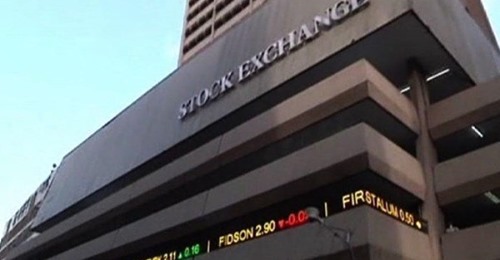Finance & EconomyNews
Bears grip Nigeria’s equities market as inflationary pressure bites harder

- This week, the Nigerian stock market ended on a bearish note for the second week in a row, with the All-Share Index shedding 0.14% to close at 51,705.61 basis points as the market begins to feel the pressure as a result of hike in interest rate by the CBN and galloping inflationary numbers.
- The global economy is currently dealing with unprecedented level of inflation rate, attributed to the surge in energy prices and food crisis in major markets across the globe. The Central Bank of Nigeria raised the MPR to 13% by 150 basis points in May 2022, which is yet to abate the rising cost of goods and services in the country.
- Here is a compilation of this week’s notable happenings in the Nigeria macro-economic space, markets, regulators as well as other world economies.
- EQUITIES
- The Nigerian equities market closed the week with a 0.14% decline in the all-share index and the market capitalization to close at 51,705.61 basis points and N27.875 trillion respectively. The performance for the week is following the selloffs recorded in the previous week, leading to the 2.68% ASI decline.
- However, on the month-to-date basis, the market has dipped 2.42%, recorded a gain of 10.09% between April to date, while the market gained 21.04% year-to-date. The best performing stocks for the week were NAHCO, Champion Brew, and MRS Oil, while the top decliners were CWG, RT Briscoe, and Glaxo SmithKline.
- A total turnover of 1.12 billion shares valued at N13.703 billion in 22,350 deals were traded this week by investors on the floor of the Exchange, in contrast to a total of 940.892 million shares valued at N11.494 billion that exchanged hands last week in 20,077 deals.
- The Financial Services Industry led the activity chart during the week in terms of traded volume with 806.824 million shares valued at N6.075 billion traded in 11,071 deals; thus contributing 71.99% and 44.33% to the total equity turnover volume and value respectively.
·
- MACROECONOMY
- Exchange rate
- Nigeria’s official exchange rate gained 0.28% during the week to close at N420.13/$1 in contrast to N421.33/$1 recorded at the close of trading activities in the previous week. This is according to daily data tracked from the website of the FMDQ.
- A total turnover of $590.91 million was recorded in the week, compared to $376.1 million recorded in the previous week. Note that there was a public holiday declaration on Monday, 13th June 2022, hence, contributing to the low volume of FX transactions recorded in the previous week.
- On the other hand, naira closed at N610/$1 on Friday, 24th June 2022 at the parallel market compared to N607/$1 recorded in the previous week. This represents a depreciation of 0.49% of the local currency against the USD.
- In the same vein, the exchange rate at the peer-to-peer market closed at N612/$1, representing a 0.92% depreciation compared to N607/$1 recorded as of the previous week.
- External reserve
- Nigeria’s external reserve continued in its upward trend during the week following the $148.43 million gained in the previous week. The external reserve level improved by $220.05 million in the week under review to stand at $38.88 billion as of Thursday, 23rd June 2022.
- The Nigerian reserve level had plunged considerably, due to the apex bank’s continual intervention in the official I&E window. However, sustained crude oil price elevation has resulted to an uptick in the nation’s foreign reserve, which will be beneficial in defending the local currency.
- Report reveals that 15.64 million litres of petrol is smuggled out of Nigeria daily
- An estimated 15.64 million litres of petrol are smuggled out of Nigerian daily. Nigerian petroleum products retail on average 3.7 times cheaper than those of its neighbours, which has given smugglers unfair possibilities for arbitrage.
- This has led to the smuggling of an estimated 15.64 million gallons of petroleum products out of Nigeria in August 2021. This was disclosed by Chapel Hill Denham in a document titled “Dangote Refinery can provide the needed breather for Nigeria’s public finances.”
- The withdrawal of subsidies, according to the research, could accelerate an already pressured inflationary trend, but a stronger fiscal position’s positive spillover could lessen the impact on disadvantaged Nigerians.
- Traders list reasons why prices of rice, onions, cooking gas rise every week
- The price of local rice, onions, cooking gas, pepper, and other staple food items has significantly increased across major markets in Lagos State. The bi-monthly market survey is carried out by Nairalytics – the research team of Nairametrics showed.
- Specifically, the price of a big bag of dry onions rose significantly by 57.4% to sell for an average of N28,175, despite falling to N17,900 earlier in the month.
- Likewise, the price of a small basket of sweet potatoes climbed by 54.55% to sell for an average of N6,375 compared to an initial average of N4,125.
- The report also showed that a big bag of pepper that was initially sold for an average of N22,750 two weeks ago has increased to an average of N27,950, while the cost of refilling a 12.5kg cylinder of cooking gas has topped N11,250.
- It is worth noting that as of this time last year, a 12.5kg cylinder of gas was refilled for an average of N4,600, representing a 145% year-on-year price increase.
·
- REGULATORS
- High oil prices present Nigeria’s central bank with a chance to adjust the exchange rate – World Bank
- The World Bank has stated that surging oil prices, being the highest in 9 years, have provided the Central Bank of Nigeria with an opportunity to adjust the exchange rate reflective of market dynamics.
- This was disclosed by the World Bank in a document titled ‘Nigeria Development Update (June 2022): The Continuing Urgency of Business Unusual.’
- The international lender told the Central Bank of Nigeria that timely and consistent monetary policy and exchange rate unification have become critical. The Bank also stated that despite the CBN’s claim of unifying the official exchange rate the apex bank still supplies FX to at least four windows.
- World Bank opined that Nigeria’s regulatory uncertainties has affected its holding of a licensing round for oil blocks in 15 years
- Nigeria has not held a licensing round for oil blocks other than marginal fields since 2007, due to uncertainties about future regulatory and fiscal frameworks. This according to the World Bank, contributes to Nigeria’s decline in oil production.
- This was disclosed by the World bank in a document titled ‘Nigeria Development Update (June 2022): The Continuing Urgency of Business Unusual.
- The World Bank also stated that security concerns, tense relationships with workers and communities, high costs, and the Federation’s failure to finance the production of its equity oil have also contributed to plaguing Nigeria’s oil production for many years.
- DMO says subscriptions for FGN bonds rose to over N1 billion in months
- The Debt Management Office (DMO) stated that subscription to FGN savings bonds has increased from about N100 million to over N1 billion in the last few months.
- This was said in an interview with the News Agency of Nigeria (NAN) on Tuesday in Ibadan by Mr. Monday Usiade, Director, Business Development Department of the DMO.
- The DMO urged more Nigerians to invest in the various Federal Government securities to diversify their investment portfolios. The DMO stated that it is specifically targeting retail investors.
- NYSC Trust Fund: Nigeria’s National Assembly bent on taxing businesses out of existence – Taiwo Oyedele
- Taiwo Oyedele, Fiscal Policy Partner and Africa Tax Leader at PwC has lamented the excessive tax placed by the National Assembly on companies’ profit in Nigeria.
- He stated that it seems “it seems @nassnigeria is bent on taxing businesses out of existence,” via a Twitter post.
- This comment comes in the wake of the proposed bill seeking to establish a National Youth Service Corps Trust Fund by the Nigeria Senate.
- Joint Tax Board to go after political office holders evading tax
- To ensure that those holding political offices pay their taxes, the Joint Tax Board (JTB) claims it is working with the Code of Conduct Bureau, political parties, and other stakeholders.
- At a meeting with state chairs of the Internal Revenue Service on Thursday in Abuja, Mr Monday Onyeme, the executive chairman of the Delta State Internal Revenue Service, said this.
- The meeting was organised by the Joint Tax Board with the theme, “Effective Tax Compliance for Political Office Holders: A Panacea for National Development”.
·
- CRYPTOCURRENCY
- Bitcoin investors record losses of over $7 billion in recent market selloff
- Data from blockchain analytics firm, Glassnode, reveals that investors exited bitcoin positions worth a record $7.3 billion over the past few days, amounting to the biggest U.S. dollar-denominated losses in the asset’s history.
- Realized loss denotes the total loss (U.S. dollar value) of all moved coins whose price at their last movement was higher than the price at the current movement, as per Glassnode. The tool can be used to measure how many coins moved at any particular price and the losses incurred by investors.
- The data revealed that approximately 555,000 BTC have changed hands between prices of $18,000 and $23,000, a strong support and resistance level respectively for the asset ranged over the past few days. The losses ranged between $1.5 billion and $2 billion each day, data shows.
- Despite falling below $20,000, over 50% of Bitcoin addresses are still in profit
- Data from on-chain analytics firm, Glassnode, reveals that more than half of Bitcoin wallet addresses existing are still in profit, raising questions about the severity of the current market selloff we are experiencing as Bitcoin over the weekend fell below $20,000.
- Glassnode confirmed that as of June 20, 56.2% of wallet addresses were still worth more in U.S. dollar terms than when their coins entered them.
- USDC Overtakes USDT in Real Volume on Ethereum
- Circle’s USD Coin (USDC), the second-largest stablecoin by market capitalization, is
- taking a run at the title of the top stablecoin in the cryptocurrency space as data from Messari, a cryptocurrency market data tool, revealed that the USDC daily ‘real volume’ on the Ethereum network has doubled that of Tether’s USDT. Messari’s data indicated that Circle’s USDC posted $1.1 billion in daily real volume on the Ethereum network on June 21, which was double USDT’s real volume of $579 million.
- Messari’s real volume metric is calculated by compiling data only from exchanges that the platform believes have “significant and legitimate crypto trading volumes,” and thus differs to the more-commonly seen “total volume” metric.
- Harmony Network’s Horizon Bridge hacked, $100 million stolen
- A popular product on the Harmony network was exploited for over $100 million worth of cryptocurrencies last night in what is one of the biggest crypto hacks in recent weeks.
- “The Harmony team has identified a theft occurring this morning on the Horizon bridge amounting to approx. $100MM,” developers said in a tweet. “We have begun working with national authorities and forensic specialists to identify the culprit and retrieve the stolen funds.” CULLED FROM NAIRAMETRICS




